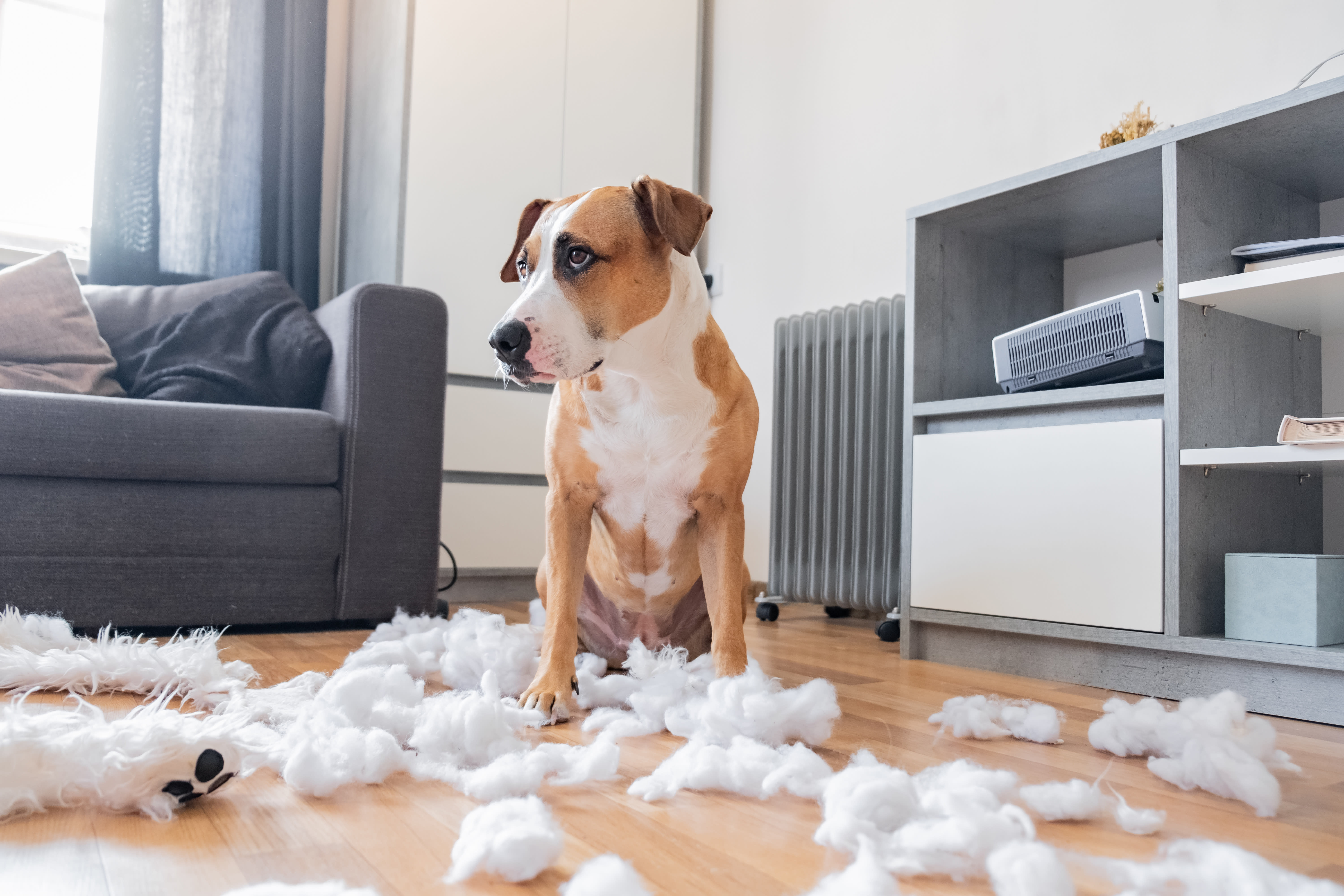Chewing is a completely normal and healthy activity for puppies and dogs but can become an issue when it becomes destructive to your home and belongings (you didn't need those shoes, did you?). If you're having problems with your dog chewing, here are a few tips from our Greensboro vets on how to stop a dog from chewing things they shouldn't.
Why do dogs chew?
Chewing on objects is your dog's way of exploring the world around them. For young dogs, it can relieve pain caused by teething. For adult dogs, chewing helps keep their jaws strong and teeth clean. A few other common reasons for chewing are:
Stress & Anxiety
Dogs are social creatures at heart and many can suffer separation anxiety when their owners are away. Dogs who chew when left alone, or more intensely when left alone, may be experiencing separation anxiety. Often they will display this anxiety in other ways as well, such as whining, barking, urination, or defecation.
Boredom
Dogs need mental stimulation! If spending extended periods of time alone or without toys and activities, your dog may resort to chewing on anything they find interesting around the house.
Puppy Teething
Like human babies, puppies can be uncomfortable while teething. During this time, puppies may chew more frequently to relieve pain and discomfort. Your puppy may also lick, suck, or chew at fabric materials which could be a result of having been weaned from their mother too early. This behavior should subside as your pup grows but if you have any concerns about your puppy's health, please contact us to schedule an appointment,
Hunger
It is not uncommon for dogs on calorie-restricted diets to begin chewing on objects in an effort to find other sources of nutrition. Typically, this type of chewing is directed at objects that smell like food, such as plastic bowls.
How do I stop my dog from chewing my stuff?
If your dog is exhibiting signs of destructive chewing, your first step should be to try to identify the cause behind the problem. Often with a little work and attention, you can redirect your dog's chewing to more desirable objects, such as chew toys.
Exercise
Daily exercise is important to keep your dog happy and healthy. Allowing your dog to get a walk or run in before you leave the house is one of the best ways to curb destructive chewing. Some breeds require more exercise than others! High energy breeds such as German Shepherds, Springer Spaniels, and Border Collies need up to two hours of exercise each day. Low energy dogs, such as Pugs, Shih Tzus, or Pomeranians, will often be content with about 40 minutes of exercise daily.
Entertainment
Helping reduce boredom and separation anxiety in dogs that spend time alone can help with destructive chewing. A good way to do this is to get your dog to associate time alone with a positive experience. When you leave the house, provide a puzzle toy stuffed with food, or find a toy they love and only give it to them when you're away. This will help retain the novelty of the toy.
Another great way to help with boredom is to provide variety! Leaving your pooch with lots of interesting toys can help serve as a distraction from objects that are not meant to be chewed.
Dog Proofing
Removing all other temptations can help ensure that your pup only chews designated objects. Put any objects you don't want to be chewed out of reach of your pup and be sure to close doors to rooms you don't want them getting into!
Discourage Unwanted Chewing
Any time you see your dog chewing on something they shouldn't be, take the object away, say "no," and replace the object with one of their chew toys. Repetition is key here and be sure to praise your dog when they chew on the desired item instead!
If you're still having issues with chewing after having tried the suggestions above, you may want to consider spraying objects that cannot be removed from your pup's reach with a dog deterrent spray.
Note: The advice provided in this post is intended for informational purposes and does not constitute medical advice regarding pets. For an accurate diagnosis of your pet's condition, please make an appointment with your vet.
If you're concerned about your dog's chewing habits and would like to schedule an appointment for your pup, please reach out to our team at Friendly Animal Clinic and we would be more than happy to help!

Looking for a vet in Greensboro?
We're always accepting new patients, so contact our veterinary hospital today to book your pet's first appointment.
Related Articles View All
Seasonal Allergies in Dogs - Signs & How to Help
Seasonal allergies can be just as problematic for our canine companions as they are for us, although their symptoms are quite different. From itchy eyes to hair loss, here you will find information on the symptoms of seasonal allergies in dogs and how to help your pup feel better.
What are these dark patches on my dog's skin?
Is your dog developing dark patches on their skin? It could be hyperpigmentation. In today's post, you'll find information about hyperpigmentation in dogs, including what causes it and how it can be treated.
Dog Skin Problems: Dog Scratching, Itching, & Other Issues
In dogs, itching, scratching and licking are common signs of a skin condition called dermatitis. Our Greensboro vets list potential causes for your pup's skin problem and how you can help your pet feel better.
